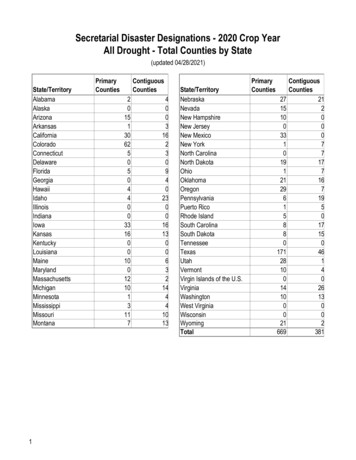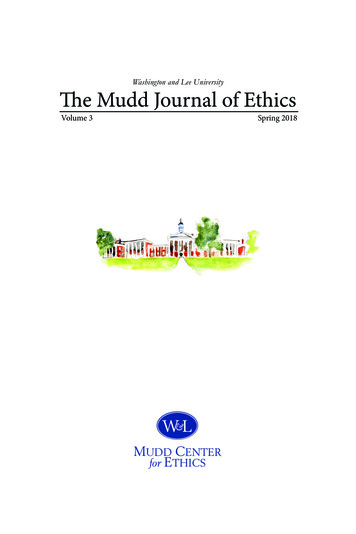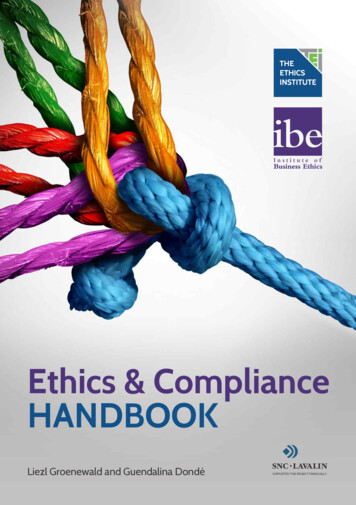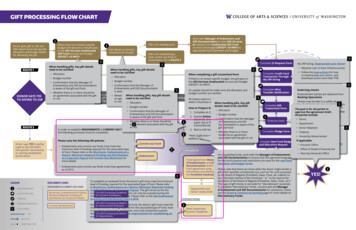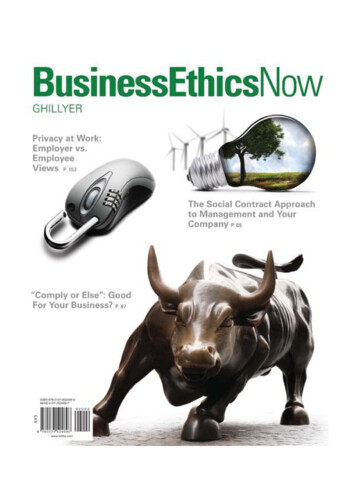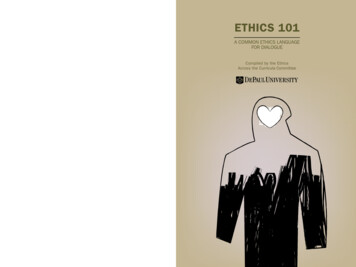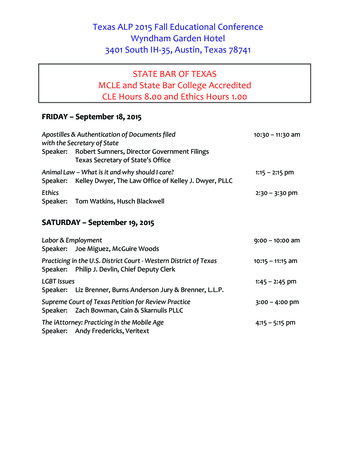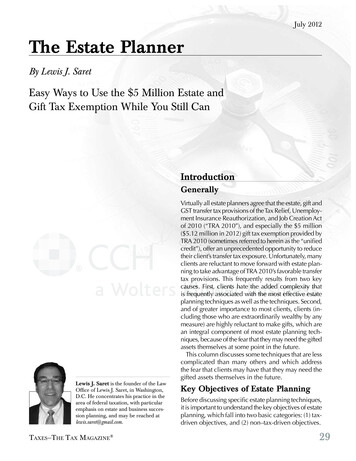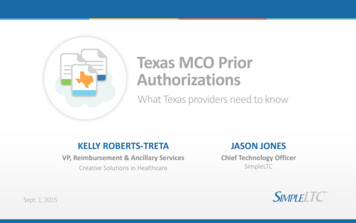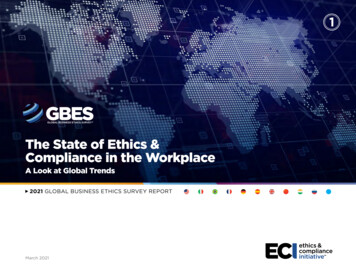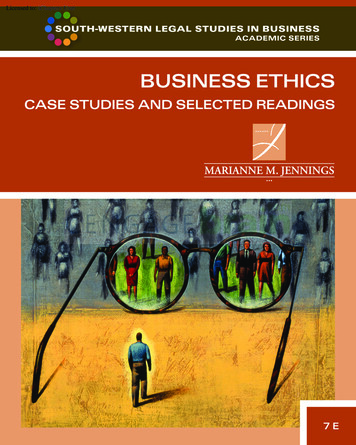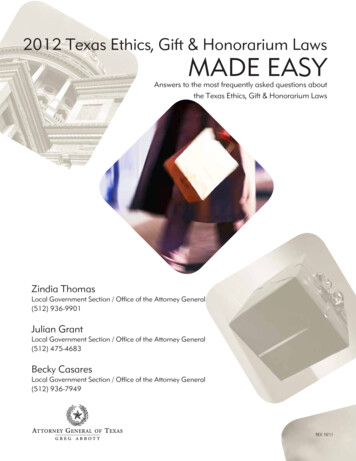
Transcription
2012 Texas Ethics, Gift & Honorarium LawsMADE EASYAnswers to the most frequently asked questions aboutthe Texas Ethics, Gift & Honorarium LawsZindia ThomasLocal Government Section / Office of the Attorney General(512) 936-9901Julian GrantLocal Government Section / Office of the Attorney General(512) 475-4683Becky CasaresLocal Government Section / Office of the Attorney General(512) 936-7949rev 10/11
Ethics, Gift and Honorarium Laws Made EasyNumerous state statutes address ethical limitations that apply to elected and appointed publicofficials, as well as to staff members. Some of the provisions are contained in the Texas PenalCode and cover the ability of local officials to accept gifts and honoraria and to use certainofficial information for their own benefit. Additionally, there are laws outside of the Penal Codethat place ethical limitations on local officials. These include laws, regulations and codes thatregulate the conduct of certain types of professionals, including attorneys, engineers, accountantsand others. Throughout the law, there are specific statutes and court decisions that have ethicalimplications, some of which are discussed in other handbooks and articles available on the TexasAttorney General’s website. Public officials and candidates for public office should payparticular attention to the reporting requirements and restrictions set forth in Title 15 of theElection Code; most ethics complaints filed with the Texas Ethics Commission stem fromalleged violations of this law. Relevant statutes, rules, opinions and frequently asked questionsmay be found on the Ethics Commission’s website at www.ethics.state.tx.us. However, neitherthis handbook nor these other resources can catalogue all relevant issues. Finally, local entitiesmight adopt ethics-related limitations through an ordinance, policy or city charter provision thatcontains such restrictions. Each of these sources should be consulted.The following questions and answers provide a layperson’s explanation of the ethics-relatedprovisions contained in state law or other sources. This handbook is intended to provide generalguidance on the issues raised in this area. The Local Government Affairs Section of the Officeof the Attorney General is available to answer questions from local officials, who shouldnonetheless consult with their own legal counsel regarding the application of the law to the factsof each particular situation.
Table of ContentsGeneral Ethics Requirements . 11.Is there a general state statute that provides a code of ethics for localofficials or staff? . 12.Are there state statutes that impose a set of professional and ethical requirementson certain professionals who may be employed by a local entity (e.g., countyengineer, city attorney)?. 13.What role does the Texas Ethics Commission have in enforcing or advising localofficials on state or local ethics requirements? . 24.Can a local governing body impose a specific set of ethical requirements on electedand/or appointed officials and staff? . 35.What types of issues are typically addressed in an ethics ordinance regarding electedand appointed officials? . 36.What types of issues are typically addressed in an ethics ordinance regardingemployees? . 3Bribery and Illegal Gift Statutes . 47.Is it illegal for a person to offer, or for a public official to accept, a gift or benefit inexchange for an exercise of official discretion? . 48.Does state law prohibit a local official or employee from accepting a gift or benefit ifthe item was offered or accepted after the exercise of official discretion? . 49.Does state law prohibit a local official or employee from accepting a gift or benefit ifit was unsolicited and if it can be shown that it did not influence the exercise ofofficial discretion? . 510.Can a local official or staff member accept a gift that is simply provided in appreciationfor superior public service and that is not in exchange for any official exercise ofdiscretion? . 511.What is considered a “gift or benefit” for purposes of the general prohibition againstthe acceptance of gifts by public officials and public employees? . 512.Are there exceptions to the gift or benefit limitations that apply to public officialsand public employees? . 513.What can public officials or public employees do with unsolicited benefits that theyare prohibited from accepting? . 614.Can a public official or employee be criminally prosecuted if found to have illegallyaccepted a gift or benefit? . 615. Can a public official or public employee be removed from office if found to haveillegally accepted a gift or benefit? . 6
Honorarium Statutes . 716.Does state law prohibit a public official or public employee from accepting anhonorarium or other item of value in exchange for providing a speech or other service? . 717.Is the prohibition on accepting honoraria waived if the public official or employeeprovides the speech or service on his or her own personal time and there is noexpenditure of public resources? . 718.Does the prohibition against honoraria apply to expenses incurred by a public servantfor food, lodging or transportation in connection with providing a speech or service? . 8Misuse of Government Property Statutes. 819.Does state law prohibit a public official or public employee from using governmentproperty for personal purposes? . 820.Does state law prohibit the use of public employees to perform private work for publicofficials during work hours? . 821.Can a public official use government property or the services of public employees forprivate purposes if the public entity is reimbursed for the value of the property usage orservice that is provided?. 822.Can a public official use a public employee to perform private work if the employeeis paid for the value of the work and the work is performed on the employee’s owntime without the use of any public resources? . 823.Can a public official or public employee be criminally prosecuted for a violation of themisuse of government property law? . 924.Can a public official or public employee be removed for violation of the misuse ofgovernment property prohibition? . 9Misuse of Official Information Statutes . 925.Does state law prohibit a public official or public employee from using confidentialinformation to gain a benefit or advantage? . 926.Does the prohibition on the misuse of government property apply to a public officialor employee who uses information that is deemed open to the public (e.g., anopen record)? . 927.Can a public official or public employee be removed for a violation of the misuseof official information prohibition? . 928.Can a public official or public employee be criminally prosecuted for a violationof the misuse of official information law? . 10Acknowledgment . 10
General Ethics Requirements1. Is there a general state statute that provides a code of ethics for local officials or staff?There is not a general statutory code of ethics specifically for local officials or staff. Todetermine whether an official has violated any ethical duties, one must consult several Texasstatutes, including the conflict of interest laws under chapters 171 and 176 of the LocalGovernment Code, as well as any special statutes that may apply to the conduct or to theprofession at issue. Most local officials are also “public servants” for purposes of Title 8 of theTexas Penal Code – entitled “Offenses Against Public Administration” – which addressesbribery, honoraria, impermissible gifts and abuse of office. Additionally, the official must look toany local provisions that may have been adopted through a city charter or a local ordinance orpolicy. State officials are subject to other laws, such as chapter 572 of the Government Code. Insummary, there are several provisions in Texas law that may be applicable to local officials.2. Are there state statutes that impose a set of professional and ethical requirements oncertain professionals that may be employed by a local entity (e.g., county engineer, cityattorney)?There are certain state statutes that impose a special set of professional responsibilities on howindividuals within certain professions or offices must perform their functions. For example,judges are subject to the standards imposed under the State Code of Judicial Conduct.1Generally, a judge who is a licensed attorney is subject to the code of professional responsibilityapplicable to all practicing lawyers.2 Summarized below are some professional ethical andperformance standards that may apply to local officials if they are acting within the scope of theirprofessions.Accountants: Regulated by the Texas Board of Public Accountancy. Phone: (512) 3057866. Statutes that contain the regulations: (TEX. OCC. CODE ANN.) Chapter 901 - PublicAccountancy Act. The Texas State Board of Public Accountancy can be found atwww.tsbpa.state.tx.us.Architects: Regulated by the Texas Board of Architectural Examiners. Phone: (512) 3059000. Statutes that contain the regulations: (TEX. OCC. CODE ANN.) Chapter 1051. TheTexas Board of Architectural Examiners can be found at www.tbae.state.tx.us.Physicians: Regulated by the Texas Medical Board. Phone: (800) 248-4062. Statutes thatcontain the regulations: (TEX. OCC. CODE ANN.) Chapters 151-165 - Medical Practice Act.The Texas Medical Board can be found at www.tmb.state.tx.us.Engineers: Regulated by the Texas Board of Professional Engineers. Phone: (512) 4407723. Statutes that contain the regulations: (TEX. OCC. CODE ANN.) Chapter 1001. TheBoard of Professional Engineers can be found at www.tbpe.state.tx.us.Judges: Regulated by the State Commission on Judicial Conduct. Phone: (877) 228-5750or (512) 463-5533. Statutes that contain the regulations: (TEX. OCC. CODE ANN.) Chapter 3312TEX. CODE JUD. CONDUCT, reprinted in TEX. GOV’T CODE ANN., tit. 2, subtit. G app. B (West 2005 & Supp.2011).TEX. DISCIPLINARY R. PROF’L CONDUCT 1.01-9.01, reprinted in Tex. Gov’t Code Ann., tit. 2, subtit. G app. A(West 2005 & Supp. 2011).2012 Texas Ethics, Gift & Honorarium Laws Made Easy Office of the Attorney General1
and the Code of Judicial Conduct, reprinted in Gov’t Code tit. 2, subtit G. app. B. TheCommission on Judicial Conduct can be found at www.scjc.state.tx.us.Lawyers: Regulated by the State Bar of Texas. Phone: (800) 204-2222. Statutes thatcontain the regulations: Texas Disciplinary Rules of Professional Conduct (1990), reprintedin Gov’t Code tit. 2, subtit. G. app. A. The State Bar of Texas can be found atwww.texasbar.com.Nurses: Regulated by the Texas Board of Nursing. Phone: (512) 305-7400. Statutes thatcontain the regulations: (TEX. OCC. CODE ANN.) Chapter 301. The Board of NurseExaminers can be found at www.bon.state.tx.us.Physical Therapists and Occupational Therapists: Regulated by the Executive Councilof Physical Therapy and Occupational Therapy Examiners. Phone: (512) 305-6900.Statutes that contain the regulations: (TEX. OCC. CODE ANN.) Chapter 452. The ExecutiveCouncil of Physical Therapy and Occupational Therapy Examiners can be found atwww.ecptote.state.tx.us.Plumbers: Regulated by the Texas Board of Plumbing Examiners. Phone: (512) 936-5200or (800) 845-6584. Statutes that contain the regulations: (TEX. OCC. CODE ANN.) Chapter1301. The Board of Plumbing Examiners can be found at www.tsbpe.state.tx.us.Real Estate Professionals: Regulated by the Texas Real Estate Commission. Phone: (512)459-6544. Statutes that contain the regulations: (TEX. OCC. CODE ANN.) Chapters 1101,1102 and 1103. The Real Estate Commission can be found at www.trec.state.tx.us.For a complete list of state licenses issued for various occupations, see www.texas.gov.Local professionals may also voluntarily join professional associations that have a code of ethicsfor their members. For example, city managers and local attorneys often belong to organizationsthat have their own code of ethics for members. If a member is found to have violated the codein the performance of his profession, the organization might issue a written reprimand to theperson and/or cancel the person’s membership in the organization. Since membership in such anorganization is voluntary, the remedies available to the organization are limited.3. What role does the Texas Ethics Commission have in enforcing or advising local officialson state or local ethics requirements?The Texas Ethics Commission administers and enforces several types of statutes, includingcampaign finance laws, political advertising laws, lobbying restrictions and filing requirementsof personal financial statements. 3The Texas Ethics Commission may also issue advisory opinions to a requestor subject to Chapter36 (Bribery, Gift and Honorarium laws) or Chapter 39 (Misuse of Government Resources) of thePenal Code. The Commission will consider an opinion request only from a person who seeksadvice on how the law applies to that person in regard to a specific factual situation, eitherexisting or hypothetical. Once an opinion is issued by the Commission, the opinion is an openrecord and is posted on the agency’s website. The requestor may choose to keep his or her name3See TEX. GOV’T CODE ANN. § 571.061 (West Supp. 2011).2012 Texas Ethics, Gift & Honorarium Laws Made Easy Office of the Attorney General2
confidential. Reasonable reliance upon a written advisory opinion issued by the Commissionmay serve as a defense to prosecution or the imposition of a civil penalty.44. Can a local governing body impose a specific set of ethical requirements on elected and/orappointed officials and staff?Unless prohibited by law, a governing body, by majority vote of its members, may impose a setof ethical requirements for elected and/or appointed local officials and staff. If adopted, such aset of requirements is generally contained in an ethics ordinance or policy. In home rule cities(cities that adopted a home rule charter while over 5,000 in population), such ethical limitationsmay also be contained in the city charter, as well as in the city ethics ordinance or policy.5. What types of issues are typically addressed in an ethics ordinance regarding elected andappointed officials?An ethics ordinance regarding elected and appointed officials typically addresses issues such as:conflicts of interest;5 voting on zoning classifications affecting property owned by an officialwithin a certain distance; supplemental compensation; outside employment; representingbusiness entities before a board, commission or governing body;6 post-employment restrictions;restrictions on lobbying for ballot items; requirements for annual financial disclosure statements;and the receipt of gifts.7Some large cities such as Dallas, El Paso, Houston and San Antonio have also imposedregistration and reporting requirements on local lobbyists and other individuals and entities.To the extent authorized by law, local ordinances may be stricter than state law but may notlower the standards set forth in state law.6. What types of issues are typically addressed in an ethics ordinance regarding employees?An ethics ordinance regarding employees typically addresses issues such as: supplementalcompensation; outside employment; representing business entities before a board, commission orgoverning body;8 post-employment restrictions; restrictions on lobbying for ballot items; and thereceipt of gifts.9456789Id.See SACHSE, TEX. HOME RULE CHARTER § 14.08.See FORT WORTH, TEX., CODE OF ORDINANCES § 2-238(b)(1).See SOUTHLAKE, TEX., CODE OF ORDINANCES § 2-264(a)(1); FORT WORTH, TEX., CODE OF ORDINANCES § 2238(a); see also TEX. PEN. CODE ANN. § 36.08 (West 2003).See FORT WORTH, TEX., CODE OF ORDINANCES § 2-238(b)(1).See SOUTHLAKE, TEX., CODE OF ORDINANCES § 2-264(a)(1); FORT WORTH, TEX., CODE OF ORDINANCES § 2238(a); see also TEX. PEN. CODE ANN. § 36.08 (West 2003).2012 Texas Ethics, Gift & Honorarium Laws Made Easy Office of the Attorney General3
Bribery and Illegal Gift Statutes7. Is it illegal for a person to offer, or for a public official to accept a gift or benefit inexchange for an exercise of official discretion?Section 36.02 of the Texas Penal Code makes it a crime of bribery for a person to offer, confer oragree to confer, or for a public official or employee to accept, agree to accept or solicit, anybenefit as consideration for a decision, opinion, recommendation, vote or other exercise ofdiscretion.10 The Penal Code defines a prohibited “benefit” as:Anything reasonably regarded as pecuniary [monetary] gain or pecuniaryadvantage, including benefit to any other person in whose welfare the beneficiaryhas a direct and substantial interest.11In other words, a benefit would include anything that is offered that a reasonable person wouldconsider having some monetary value, whether it is given to the public official or to someone inwhom the official has a direct and substantial interest (such as a family member or a businessassociate).The state law on bribery does not contain a monetary threshold at which point a benefit that isprovided could be considered a potential bribe. Therefore, anything that a reasonable personwould find as having a monetary value should be refused. The Texas Ethics Commission,however, has advised that a plaque, unless it was quite elaborate, would not be considered abenefit under the bribery law if such item is unsolicited and not offered or accepted in exchangefor any action or inaction on the part of a public servant.12To prove bribery, a prosecutor must show that the benefit offered or given to an official wasdone so as consideration for an official’s decision, vote, recommendation or other exercise ofdiscretion. Whether a benefit was given as consideration for such actions remains a factquestion that would have to be addressed on a case-by-case basis by the local prosecutor.However, it is important to note that the Penal Code prohibits, with certain exceptions, a publicofficial from ever accepting a benefit from a person subject to his or her jurisdiction, regardlessof whether it was in consideration or in exchange for any official action.138. Does state law prohibit a local official or employee from accepting a gift or benefit if theitem was offered or accepted after the exercise of official discretion?Even if an item was offered or accepted after the exercise of an official action, it may still beconsidered bribery of a public official or employee. According to section 36.02(c) of the PenalCode, the fact that a benefit was not offered or accepted until after the exercise of some officialdiscretion is not a defense to bribery.10111213TEX. PEN. CODE ANN. § 36.02(a) (West 2003).Id. § 36.01(3).Op. Tex. Ethics Comm’n No. 36 (1992).TEX. PEN. CODE ANN. §§ 36.08, 36.10 (West 2003 & Supp. 2011).2012 Texas Ethics, Gift & Honorarium Laws Made Easy Office of the Attorney General4
9. Does state law prohibit a local official or employee from accepting a gift or benefit if it wasunsolicited and if it can be shown that it did not influence the exercise of officialdiscretion?Even if an item was not solicited and had no influence over the decision that was made, it maystill be considered bribery of a public official or employee. The fact that a benefit did not haveinfluence over the decision would not be considered a defense to a prosecution for bribery.Additionally, it is important to note that the Penal Code generally prohibits a public servant fromever accepting a benefit from a person subject to his or her jurisdiction, regardless of whether itwas in consideration or in exchange for any official action.14 There are some exceptions to thisprohibition (see below). (Nonetheless, these exceptions do not apply to the bribery statute.)10. Can a local official or staff member accept a gift that is simply provided in appreciation forsuperior public service and that is not in exchange for any official exercise of discretion?The Penal Code generally prohibits a public official from ever accepting a benefit from a personsubject to his or her jurisdiction, regardless of whether it was in recognition of superior serviceor a token of gratitude.1511. What is considered a “gift or benefit” for purposes of the general prohibition against theacceptance of gifts by public officials and public employees?A gift or benefit is considered anything reasonably regarded as monetary gain or a monetaryadvantage. A floral arrangement, gift basket or other item would constitute a gift. Similarly,tickets to an event or the provision of complimentary or discounted services or products wouldlikewise constitute a gift. Whether an item has such a value is a fact question that must bedetermined on a case-by-case basis by the local prosecutor.12. Are there exceptions to the gift or benefit limitations that apply to public officials andpublic employees?Several exceptions exist to the prohibition against providing a gift to a public official or publicemployee. (Again, these are not exceptions to the bribery statute.) The following are notprohibited:1. Token Gifts: An item that has a value of less than 50, excluding cash or anegotiable instrument, if it was not given in exchange for any exercise of officialdiscretion;2. Gifts from Family or Close Friends: A gift conferred by an official’s family orby a personal friend, if there is an independent relationship that is not related tothe status or work of the official;3. Gifts from Individuals with Whom the Public Official or Public EmployeeHas an Independent Business Relationship: A gift conferred by a professionalor business contact if there is an independent relationship that is not related to thestatus or work of the official;1415Id.Id.2012 Texas Ethics, Gift & Honorarium Laws Made Easy Office of the Attorney General5
4. Statutorily Provided Fees: A fee that is provided by law that an official islawfully entitled to receive for performing some function other than his or herofficial function as a public servant (e.g., jury duty fee);5. Payment of Expenses: This exception applies only to a benefit given in honor orappreciation to a public servant who is required to file a campaign finance reportunder Title 15 of the Election Code or to file a personal financial disclosurestatement under Chapter 572 of the Government Code. This benefit must be usedsolely to defray expenses that accrue in the performance of duties or activities inconnection with the office. The expenses must be non-reimbursable by thepolitical subdivision. The benefit and the source of any benefit in excess of 50must be reported in the campaign finance report or the personal financialdisclosure statement;6. Political Contributions as defined by Title 15 of the Election Code; and7. Food, lodging, transportation or entertainment accepted as a guest. A publicservant may lawfully accept food, lodging, transportation or entertainment as aguest – meaning that the recipient must be in the presence of the donor.16 Apublic servant may accept lodging, transportation and meals in connection with aseminar or conference in which the public servant renders a substantive service.17Each exception has its own reporting requirements.13. What can public officials or public employees do with unsolicited benefits that they areprohibited from accepting?A public official or employee who receives an unsolicited benefit may donate the benefit to arecognized tax-exempt charitable organization formed for educational, religious or scientificpurposes.18 However, this exception does not apply if the gift was provided as part of anhonorarium. In such a case, the gift should be refused, and the offering entity is free to makesome other use of the benefit.14. Can a public official or employee be criminally prosecuted if found to have illegallyaccepted a gift or benefit?A public official who accepts or solicits a gift or benefit in exchange for some exercise of officialdiscretion may be prosecuted for bribery, which is a felony of the second degree.19 A publicofficial who accepts or solicits a gift or benefit from a person subject to his or her jurisdictioncan be prosecuted for accepting an illegal gift, which is a Class A misdemeanor.2015. Can a public official or public employee be removed from office if found to have illegallyaccepted a gift or benefit?There is no special remedy under the Penal Code that provides for removal of a public officialdue to a violation of the gift laws. However, if a person is criminally convicted of such anoffense, it may affect his or her eligibility for office. Additionally, such a conviction may act toautomatically remove the official from office or be a ground for seeking the removal of a1617181920Id. § 36.07(b).Id. § 36.10(a).Id. § 36.08(i).Id. § 36.02(e).Id. § 36.08(h).2012 Texas Ethics, Gift & Honorarium Laws Made Easy Office of the Attorney General6
member of a governing body through a recall or other removal action if such action is authorizedunder state law or a city charter.21Honorarium Statutes16. Does state law prohibit a public official or public employee from accepting an honorariumor other item of value in exchange for providing a speech or other service?State law generally prohibits a public servant from soliciting, accepting or agreeing to accept anhonorarium in consideration for services that the public servant would not have been requested toprovide but for the public servant’s official position or duties.22In other words, acceptance of an honorarium by a public official or employee is prohibited if thepublic servant was asked to provide the speech or the service because of his official position orknowledge that was gained in his official position.Although the Penal Code does not define “honorarium,” numerous ethics opinions and attorneygeneral opinions can provide some guidance. The Texas Ethics Commission has noted that an“honorarium” is commonly understood to be “a payment in recognition of acts or professionalservice for which custom or propriety forbids a price to be set.”23 The Ethics Commission hasdetermined that fees for speaking, teaching and certain other services are included in the term“honorarium.”24 The Ethics Commission has concluded that an honorarium payment “inconsideration for services” can be either payment of contractual consideration or payment inappreciation of such services.25The holding in GA-354 (2005) is also illustrative. A payment by a private association of publicofficials, compensating one of its members for services as its immediate past president, does notper se violate sections 36.07 (concerning prohibited honoraria) or 36.09 (concerning the offer ofa gift to a public servant) of the Texas Penal Code. Section 36.07 does not prohibit faircompensation to a person for services as the president of a private association, assuming theperson was elected president because of the person's skills and abilities and not because theperson is a public servant of a particular county or district. Section 36.09 does not prohibitpayment to a person for legitimate consideration rendered in a capacity other than as a publicservant
Examiners can be found at www.bon.state.tx.us. Physical Therapists and Occupational Therapists: Regulated by the Executive Council of Physical Therapy and Occupational Therapy Examiners. Phone: (512) 305-6900. Statutes that contain the regulations: (TEX. OCC. CODE ANN.) Chapter 452. The Executive
